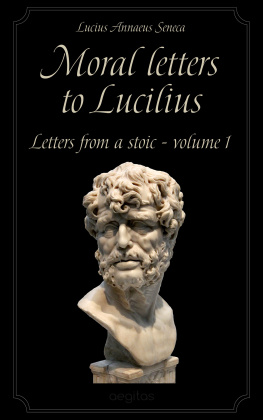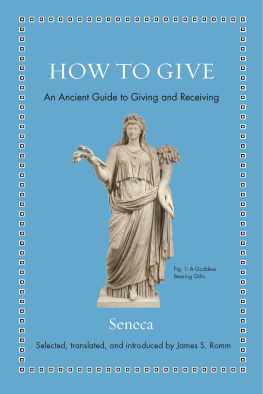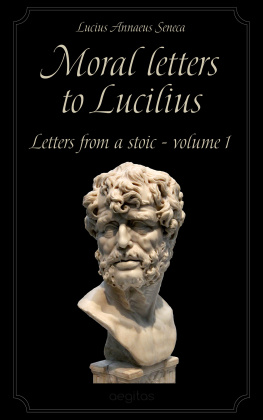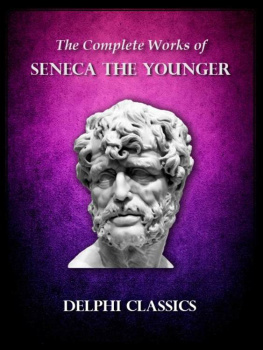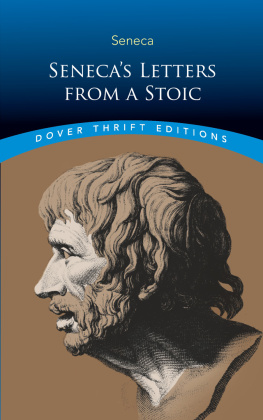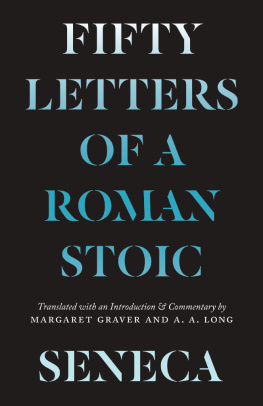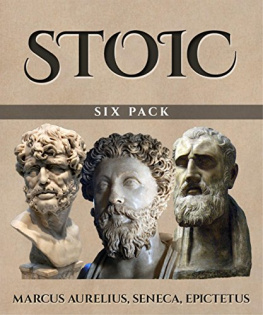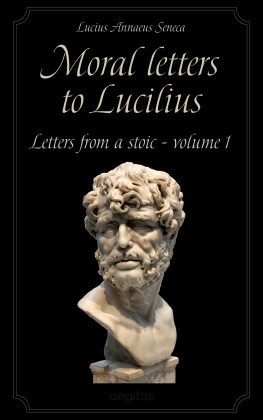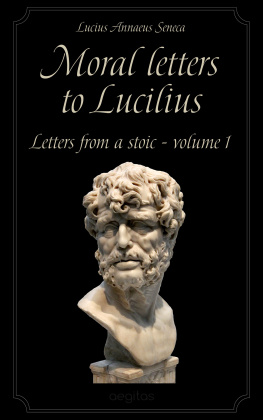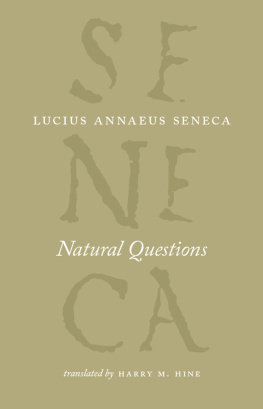Seneca - Dialogues and Letters
Here you can read online Seneca - Dialogues and Letters full text of the book (entire story) in english for free. Download pdf and epub, get meaning, cover and reviews about this ebook. year: 1997, publisher: Penguin Classics, genre: Religion. Description of the work, (preface) as well as reviews are available. Best literature library LitArk.com created for fans of good reading and offers a wide selection of genres:
Romance novel
Science fiction
Adventure
Detective
Science
History
Home and family
Prose
Art
Politics
Computer
Non-fiction
Religion
Business
Children
Humor
Choose a favorite category and find really read worthwhile books. Enjoy immersion in the world of imagination, feel the emotions of the characters or learn something new for yourself, make an fascinating discovery.
- Book:Dialogues and Letters
- Author:
- Publisher:Penguin Classics
- Genre:
- Year:1997
- Rating:3 / 5
- Favourites:Add to favourites
- Your mark:
- 60
- 1
- 2
- 3
- 4
- 5
Dialogues and Letters: summary, description and annotation
We offer to read an annotation, description, summary or preface (depends on what the author of the book "Dialogues and Letters" wrote himself). If you haven't found the necessary information about the book — write in the comments, we will try to find it.
Seneca: author's other books
Who wrote Dialogues and Letters? Find out the surname, the name of the author of the book and a list of all author's works by series.
Dialogues and Letters — read online for free the complete book (whole text) full work
Below is the text of the book, divided by pages. System saving the place of the last page read, allows you to conveniently read the book "Dialogues and Letters" online for free, without having to search again every time where you left off. Put a bookmark, and you can go to the page where you finished reading at any time.
Font size:
Interval:
Bookmark:

SENECA: DIALOGUES AND LETTERS
LUCIUS ANNAEUS SENECA, statesman, philosopher, advocate and man of letters, was born at Cordoba in Spain around 4 BC. Despite his relatively undistinguished background and ever-recurrent ill health, he rose to prominence at Rome, pursuing the double career, in the courts and political life, for which he had been trained. He began also quickly to acquire celebrity as an author of tragedies and of polished essays, moral, literary and scientific. Falling foul of successive emperors (Caligula in AD 39 and Claudius in AD 41) he spent eight years in exile on the island of Corsica, allegedly for an affair with Caligulas sister. Recalled in AD 49, he was made praetor, and was appointed tutor to the boy who was to become, in AD 54, the emperor Nero. On Neros succession Seneca acted for some eight years as an unofficial chief minister. The early part of this reign was remembered as a period of sound imperial government, for which, according to our sources, the main credit must be given to Seneca. His control over an increasingly cruel emperor declined as enemies turned Nero against him with representations that his popularity made him a danger, or with accusations of immorality or excessive wealth ill assorting with the noble Stoic principles he professed. Retiring from public life he devoted his last three years to philosophy and writing, particularly the Letters to Lucilius. In AD 65, following the discovery of a plot against the emperor, in which he was thought to be implicated, he and many others were compelled by Nero to commit suicide. His fame as an essayist and dramatist lasted until two or three centuries ago, when he passed into literary oblivion, from which the twentieth century has seen a considerable recovery.
C. D. N. COSTA read Classics as a Rhodes Scholar at St Johns College, Oxford, and has spent most of his working life at Birmingham University, where he is now Emeritus Professor of Classics. His main research has been writing commentaries on the works of Seneca (Letters, Dialogues and the tragedy Medea), and he has also edited Lucretius V, a book of essays on Horace and Greek Fictional Letters. Some of his translations of Senecas Letters have been given broadcast readings by Paul Scofield on BBC Radio 3.
SENECA
Edited and translated by
C. D. N. COSTA
PENGUIN BOOKS
PENGUIN BOOKS
Published by the Penguin Group
Penguin Books Ltd, 80 Strand, London WC2R 0RL, England
Penguin Group (USA) Inc., 375 Hudson Street, New York, New York 10014, USA
Penguin Books Australia Ltd, 250 Camberwell Road, Camberwell, Victoria 3124, Australia
Penguin Books Canada Ltd, 10 Alcorn Avenue, Toronto, Ontario, Canada M4V 3B2
Penguin Books India (P) Ltd, 11 Community Centre, Panchsheel Park, New Delhi 110 017, India
Penguin Group (NZ), cnr Airborne and Rosedale Roads, Albany, Auckland 1310, New Zealand
Penguin Books (South Africa) (Pty) Ltd, 24 Sturdee Avenue, Rosebank 2196, South Africa
Penguin Books Ltd, Registered Offices: 80 Strand, London WC2R 0RL, England
www.penguin.com
This edition first published 1997
Reprinted with corrections 2005
6
Translation and notes copyright C. D. N. Costa, 1997, 2005
All rights reserved
The moral right of the editor has been asserted
Except in the United States of America, this book is sold subject
to the condition that it shall not, by way of trade or otherwise, be lent,
re-sold, hired out, or otherwise circulated without the publishers
prior consent in any form of binding or cover other than that in
which it is published and without a similar condition including this
condition being imposed on the subsequent purchaser
This volume of translations from Senecas prose works is intended partly to supplement the earlier Penguin Classics selection of his letters by Robin Campbell, Seneca: Letters from a Stoic (Harmondsworth, 1969) and partly to reflect the increased interest in Seneca which has been a notable feature of classical scholarship in the latter half of this century. I would like to thank Penguin Classics for encouraging me in this project, and also Messrs Aris & Phillips for permission to use some of the translations (slightly adapted) which I wrote for the two volumes they published for me.
C.D.N.C.
October 1996
Senecas life spanned one of the most colourful and important periods of Romes history. He was born in Cordoba, probably some time between 4 and 1 BC, and he committed suicide in AD 65 because of his alleged association with the ill-fated conspiracy of Piso against Nero. Thus he lived under the first five emperors of the Roman Principate, and those varied and turbulent times both deeply affected the course of his life and closely informed the content of his writings. He is a distinguished example of a major literary figure who also played a leading part for many years in the public life of his country. One of the interesting aspects of reading Seneca is to observe, where we can, the interaction between the troubled political world in which he moved and the writings in which he reflected on that world, and tried to come to terms with it and to draw lessons for the benefit of those to whom he addressed his works.
From Spain Seneca was brought to Rome as a small child by an aunt, probably a stepsister of his mother Helvia. Otherwise we know very little about his early life. His education at Rome opened up to him the worlds of rhetoric and philosophy, which remained dominant interests for the rest of his life. Here too there was clearly a domestic influence at work. His father was passionately interested in the theory and practice of rhetoric, and has left us two important collections of rhetorical exercises culled from his own observation of rhetoricians and their pupils, the Suasoriae and Controversiae. We also know from his own writings that Seneca suffered from chronic ill-health, and (perhaps partly for that reason) he seems not to have been politically ambitious and gained a quaestorship only around the late 30s AD. He probably married twice, losing his first wife in childbirth some time before 41, and subsequently enjoying a happy marriage with Pompeia Paulina.
The year 41 was a sad landmark for Seneca, and the point from which his life becomes far better documented for us. In that year he was charged with adultery with Julia Livilla, a sister of the emperor Gaius, and exiled (strictly the milder form called relegatio) to Corsica. It is difficult now to disentangle what truth there may have been in the accusation, but two of our sources for it, Dio Cassius (60.8) and Tacitus (Ann. 12.8.3), imply Senecas innocence. At any rate he remained in exile until 49, when he was recalled through the influence of Agrippina, mother of the later emperor Nero. He then became praetor, and Agrippinas motives for favouring him were clear when she appointed him tutor to the twelve-year-old Nero. This was the beginning of a perilous relationship with Nero that lasted for the rest of Senecas life. From Neros accession Seneca acted as his official counsellor, minister and speech-writer, having in this position a staunch ally in Burrus, the prefect of the praetorian guard. For several years the young Nero was sufficiently tractable in their hands; Seneca himself became suffect consul in 56; and Rome and the empire enjoyed a period of moderately good and peaceful government. But as Seneca grew older and Nero increasingly became mentally and morally unstable, Senecas influence declined sharply, and after the death of Burrus in 62 he attempted to withdraw from public life. Nero was unwilling to let him go, but from 64 he was at last allowed to retire and live the life of a recluse. However, within a year an unsuccessful conspiracy was formed to kill Nero and replace him by C. Calpurnius Piso. Nero believed (probably wrongly) that Seneca was implicated and ordered him to commit suicide. With no choice in the matter Seneca took his own life in April 65. It was a disastrous episode for his family generally, as both of his brothers and his nephew, the poet Lucan, also met similar fates from alleged association with the conspiracy.
Font size:
Interval:
Bookmark:
Similar books «Dialogues and Letters»
Look at similar books to Dialogues and Letters. We have selected literature similar in name and meaning in the hope of providing readers with more options to find new, interesting, not yet read works.
Discussion, reviews of the book Dialogues and Letters and just readers' own opinions. Leave your comments, write what you think about the work, its meaning or the main characters. Specify what exactly you liked and what you didn't like, and why you think so.



